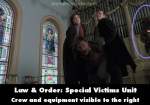Continuity mistake: When Stabler steps out to confront Tarzi, there is a long, brown brick wall to Tarzi's right. Tarzi then turns and runs across the street and is followed by Fin. Munch steps out and yells "halt!" There is another shot of Tarzi and he stops again. Right before he is tackled by Fin, behind him, to his right, is the same brick wall as before even though he crossed the street and ran down the block.
Other mistake: When Stabler, Benson, and Cabot are talking to Mrs. Cleary about the jewelry, Mrs. Cleary excuses herself to take a phone call. When the camera is on Cabot, Mrs. Cleary is in the background mirror moving her mouth although she is not saying anything.
Continuity mistake: In the scene where Detective Munch visits the hospital room of a young comatose girl for the first time, the girl's left arm is alongside her body above the top sheet. As Munch approaches the bed, her arm is below the top sheet. When Munch visits the still-comatose girl a second time in the last scene of the episode, in the foreground as he is entering the room the girl's head is turned, facing her right. As he pauses to watch her, in the next shot she is now facing upright towards the ceiling. In this same shot, the purportedly still-comatose girl slightly moves her head and lips as if swallowing.
Continuity mistake: At the beginning of the episode, Alvin Maddox looks over the counter to discover the body. Her underwear is around her right ankle. Later, when Stabler is examining the body, the underwear has shifted to be around her left ankle.
Character mistake: Sgt Lloyd Andrews' attorney, during arraignment, asked the judge that the defendant be "remanded on his own recognise." The proper terminology for ROR, and what he meant to say is "Released on his own recognizance."
Pixies (a.k.a. Little Women) - S2-E9
Visible crew/equipment: When Benson and Stabler are questioning Kyle Hubert about Kristi, there is a shot where the detectives are being shown through a large mirror in the background. A large camera is visible in the mirror on the left-hand side, next to Benson.
Visible crew/equipment: When Munch and Tutuola are 'apologizing' to the campus security cop, they all walk through a doorway with an open door. In the window of this door, you can see a crew member mirrored from behind, holding a overhead microphone (possibly a light), using a long pole.
Secrets (a.k.a. Apartment to Die For) - S2-E12
Visible crew/equipment: After the detectives bring in the fifteen adults from the swingers' club to the police station, Benson and Stabler bring in one of the men to the interrogation room. Right when they enter, an overhead microphone is visible in the top left-hand corner of the mirror behind them.
Visible crew/equipment: When the ex cop is brought in, as he's sitting down to talk with Elliot, the microphone box/equipment is visible on the back of his pants. (00:29:20)
Revealing mistake: After the detectives bust the cops while Undercover, Alex Cabot enters the interrogation room with Lorna Frankel. Shortly after, someone holding a white box is coming into view just outside the doorway. Benson is waiting for her cue to enter the room.
Visible crew/equipment: Munch and Tutuola have just arrived at Victor Coe's apartment. As they enter the living room there is a mirror on the right hand side. In the reflection you can see a man holding a camera. (00:14:05)
Visible crew/equipment: As two men chase after a kidnapper's SUV one actor's microphone is falling from his jacket, the actor trips and as he stands up he quickly tries to wrangle the microphone back up by its wire. (00:01:08)
Factual error: In the final scene where Grace Mayberry's house is raided in Trenton, NJ. a New Jersey State Trooper is wearing a badge on his chest. The NJSP has always worn a triangular shaped badge on their hats.

Visible crew/equipment: While Benson and Stabler apprehend their suspect in a church, at least one crew member appears on the right side of the frame for about 5 seconds where no one should be. (00:25:45)






Answer: I didn't see the show so I don't know the details. A general answer would be because a reckless endangerment charge is easier to prove "beyond a Reasonable Doubt" in court and get a conviction. This charge would not require the prosecutor to prove intent, which would be required for proving aggravated or simple assault. Also, if there were no visible injuries, it is difficult to show bodily injury. Just because the reckless endangerment charge was specifically mentioned, it does not necessarily mean there were not other charges filed. Police often make multiple charges, like lesser-included offenses, so that the defendant's act will fall under one of them if the legal requirements are not met for the others, if they are not sure of the best charge to make (the district attorney knows and can decide), or to have something to plea bargain with.
KeyZOid